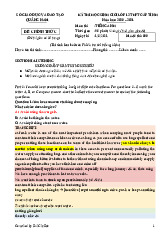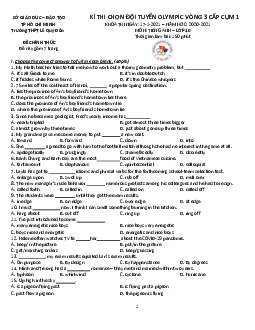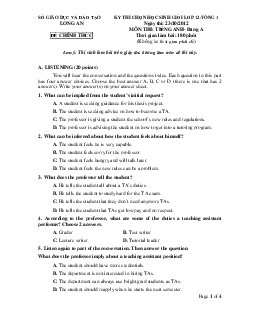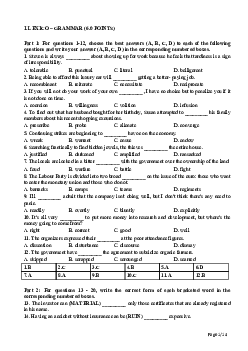
sd
GIAO
DUC
VA
DAO
TAO
Id
THI
CHON Do1
d~
DVTHI
HSG
QU~C
GIA
LAO
CAI
LOP
12
THPT
NAM
2009
M8n: Tigng
Anh
[
D~THI
C~TH&
I
Th&i
gian thi:
180
phiit
(
khbng
kd
thdi gian giao
d&)
Dk
thi g6m
cb:12
trang
I.
LISTENING
Part
1.
Listen to the first part of the passage and circle the best answer
A,
B,
C,
or
D
to the
following
questions.(0,3 point)
1.
When was the
UN
established?
A.
In
1954
B.
In
1459
2.
What was not mentioned as one of the world situations when the
UN
was established?
A.
World War I1 ended
B.
Millions of people died
C.
Destructions were found everywhere
D.
Many people became homeless
3.
How many main goals were set by the UN?
A.
2
B.
3
Part
2.
Listen to the second part of the passage andfill in the missing words.(0,5point)
Today almost every country in the world is a member of the
UN.
Each country has signed an
agreement that says:
All members are equal.
All members promise to
(1)
....................
.in a peaceful
way.
No member will use force against another member.
All members will help
(2)
.................
in its actions.
The
UN
will not
try
to solve problems within countries except to enforce international
peace.
................
Obviously, the United Nations has not been completely successful
(3)
There have been several wars since
1945.
However, the organization has helped bring
peace to some countries that were
(4)
..................
It has helped people who left their
countries because of wars. It has helped bring
(5)
.......................
to colonies.

11.
LEXICO-GRAMMAR
Part
1. In this section you must choose the word or phrase which best completes each
sentence by circling
A,
B,
C
or D.(I,Spoints)
D.
keep in with
D.
allow
D.
deepest
1.
In
spite of his poor education, he was the most
.......
speaker.
A. articulate
B.
ambiguous
C.
attentive
D.
authoritarian
2.
Wasn't it you yourself
.........
the door open?
A. to leave
B.
to have left
C.
who left
D.
that should leave
3.
.......
of the financial crisis, all they could do was hold on and hope that things would
improve.
A. At the bottom
B.
At the height
.
C.
On the top D. In the end
4.
Could you possibly
.........
me at the next committee meeting.
A.
stand in for
B.
make up for
C.
fall back for
5.
You should
.......
at least three days for the journey.
A. expect
B.
permit
C.
accept
6.
Please accept our
.......
congratulations!
A. finest
B.
warmest
C.
dearest
7.
I'd sooner they
........
deliver the new furniture tomorrow.
A.
shouldn't
B.
didn't
C.
wouldn't
D.
mustn't
8.
Sales of margarine rose last year
.......
those of butter.
A. comparing
B.
at a loss of
C.
at the expense of
D.
with regard to
............
9.
She should have been here but she's
flu.
A. gone through with
B. gone down with
C.
come in for
D. come up against
10.
The trouble with Stan is that he makes such a fuss about even the most
.....
injury.
A.
slight
B.
tiivial
C.
basic
D.
elementary
11.
......
from being embarrassed by his mistake, the lecturer went on confidently with his talk.
A.
Distaht
B.
Far
C.
A
long way
D.
Miles
12.
The increased pay offer was accepted although it
.....
short of what the employees wanted.
A. fell
B.
arrived C. came
D.
ended
13.
The competition he set up for young musicians is another
.....
of his life-long support for
the
arts.
A. exposition
B.
manifestation
C.
token
D.
exhibition
14.
The new regime determined to
.........
compulsory military service.
A.
stop off
B.
end up
C.
phrase out D. break off
15.
The tennis player couldn't
.....
the possibility of the withdrawing fiom the championship
because of injury.
A. come off B. pass over C. rule out
D.
do without
Part
2.
There are ten mistakes in the following passage. Find and correct them(1,Opoint)
Petroleum was formed on the ground many millions of years ago.
Plants
and animals live in
the sea
sank
to the sea bed when they died. Their remain mixed with sand and mud in layer
deposits, built up slowly over the years.
A
combined action of heat, pressure and bacteria turns
these deposits into petroleum. The petroleum moved slowly upwards to the porous rocks' nor
-became trapped there. In the passage of time, land that was once under water rose to the face of
the sea. As such, petroleum deposits are now found below or near
dry
land.

Part
3.
Read the text bellow. Use the word given in capitals at the end of each line to form a
word that
fZs in the space in the same line Example: (0) existence.(l,Opoint)
THE
HISTORY OF TOYS
Mistakes
1.
2.
3.
.
4.
5.
When did the first toys come into (0)
........
and what led to
their (1)
............
?
Did they represent and attempt by adults
to make children happy, or did they arise from the various
playful
(2)
....................
of children themselves? As
everyone knows, the young (3)
.......................
copy the
(4)
........................
of their elders, and, in their play, they
often adopt objects used by adults for entirely different
purposes. Those objects (5).
..................................
the
child's (6)
............
and lead to game in which every
day
articles often play unusual and (7)
....................
roles.
It is rather surprising that for an
(8)
............
of the origin
of toys, we cannot
turn
to folk stories. However, no
traditional tale
(9)
.............
to the origin of toys exists, and so
our (1
0).
.........
is restricted to archaeological study and
limited evidence
from documents.
Correction
EXIST
DEVELOP
ACTIVE
FREQUENT
BEHAVE
Mistakes
6.
7.
8.
9.
10.
COURAGE
IMAGINE
EXPECT
Correction
EXPLAIN
RELATE
KNOW
Part
4.
Supply the correct forms of the verbs given(1,Opoint)
1.
Mary
isn't here -but she (not, take)
.................
the car because there's no petrol in it.
2.
Hardly they (move)
................
into the house when their friends came.
3. Trade has gone from bad to worse and staff (lay)
..............
off now.
4. would they not rather you( seek)
...............
..new sponsors?
5.
By the time we get there now, I'm afraid the meeting (end)
.................
6. Jean, I'm so glad you've got here at last.
I
(expect)
..........
.......y
ou all day.
7.
None of the people (invite)
.......................
to the party can come.
8.
His demand was that his son (acquit)
...................
..at once.
9.
Had they not invented satellites, we (not, watch)
.................
.live programmes on
TV.
10.
What
a
pity! If only I (listen)
.................
to my parents.

Part
5.
Fill
each space with one appropriate preposition.(2,0 points)
Unlikely
as
it may seem, there has now been expert confirmation what wild
pumas
and
lynxes
are (1)
....................
large in parts of Britain, rather than being the figments
(2)
....................
some wild imaginations. Previous sightings
(3)
......................
such large jungle
cats had been put down (4)
...............
exaggeration.
(5)
..................
all, the argument went, some people are prone (6)
.....................
seeing flying
saucers and Loch Ness monster, particularly when (7)
.........................
the influence of one
drinking too much. Some newspapers were suspected (8)
.......................
having made (9)
.................
stories such as that of the Beast of Exmoor, an animal which is responsible (10)
.........................
the deaths of hundreds of sheep over the past ten years. But experts have now
come (1 1)
.....................
with proof that such stories were (12)
.................
earnest after all. The
animals are (1 3)
.................
all likelihood pets which have escaped (1 4).
...................
small zoos,
or been abandoned (15)
....................
their owners. Because the keeping (16)
........................
such animals is severely restricted (17)
.......................
the Dangerous Wild Animals Act of
1976, owners of unlicensed animals might not report an escape (1
8)
........................
fear of
prosecution. Britain's only surviving native feline species, the wild cat, is confined (19)
....................
Scotland. After examining hair samples, experts now say that the Beast of Exrnoor
in the South of England is (20)
......................
the shadow of a doubt a puma or lynx, both of
which animals are normally native to the Middle East and Asia.

Part
6.
In each space put
a/
an or the
,
or leave the space blank (x).(l,4 points)
I
came home from
(1)
...........
school one day with
(2)
.......... slight headache, and took
(2)
............
two aspirins from
(4)
...........
bottle
in
(5)
............
medicine cupboard. They left
(6)
..........
..........
curious after-taste
in
my mouth, and when my mother came home
half
(7)
hour
later
I
told her what
I
had done. She shrieked and ran to
(8)
............
telephone;
I
had taken
some tablets that
(9)
............
doctor had prescribed for her stomach cramps, and she had been
............
warned that it was dangerous to exceed
(10)
..............
stated doze
-
one tablet
(1 1)
day.
She had broken (12)
............
bottle that morning, and transferred
(13)
...........
tablets to
(14)
..........
empty aspirin bottle.
111.
READING
Part 1. Read the following text and decide which word best _fits each blank by circling
A,
B,
C
or D.(l,Spoints)
Crocodiles see well, their eyes are
(0)
..........
with three eyelids, each having a different
function. Their eyeballs slide back out of
(1)
.................
way during an attack. Should they lose
one of their eight-centimetre-long teeth, a replacement is always ready. A crocodile may go
through
(2)
........
thousand teeth during a lifetime of over seventy years. Crocodiles cannot
chew,
as
their teeth are
(3)
.........
only to penetrate and hold. These animals can attack at any
(4)
........
of the year, but they are more active in the warmer months and when in
(5)
.......
of
mates. Under water, crocodiles
(6)
........
their victims at the water's
(7)
............
by sensing any
moment in the water. Once they have a hold on their victim, they drag it deep into the water to
(8)
...............
it. They then crush and swallow it.
Many battles occur over mates. About six weeks after mating, the female
(9)
.....
a nest,
often on a river bank, and
(10)
.........
about fifty eggs. She then seals the nest for protection and
also as a way of
(1 1)
............
the temperature. After ten to twelve weeks the baby crocodiles
come out of the eggs: only about one percent of these (1
2)..
...........
it to adulthood,
as
thousands
die in flooding or are eaten by fish or bigger crocodiles. In an
(13)
.........
to ensure a source of
(14)
......... animals, crocodile farms have been
(15)
........
up, and a vast industry now exists in
crocodile skin and meat.
0.
A.found
1.
A.
harm's
.2. A. various
3.
A.
composed
4.
A.
time
(B).
equipped
B.
danger's
B.
several
B.
constituted
B.
phase
C. stocked
C. injury's
C. considerable
C.
designed
C.
month
D.
fitted
D.
damage's
D.
numerous
D.
styled
D.
interval

5.
A.
discovery
6.
A.
prefer
7.
A.
border
8.
-A.
sink
9.
A.
installs
10.
A.
lays
1 1.
A. dominating
12. A. reach
13.
A.
attempt
14.
A.
well
15.
A. put
B.
hunt
B.
accept
B.
rim
B.
drown
B.
makes
B.
sets
B.
ruling
B.
make
B. action
B.
fine
B.
taken
C.
exploration
C.
propose
C.
edge
C.
capsize
C.
manufactures
C.
drops
C.
imposing
C.
get
C.
aspiration
C.
fit
C.
set
D. search
D. choose
D. shore
D.
soak
D.
produces
D. puts
D. controlling
D. arrive
D.
alternative
D.
healthy
D.
stood
Part
2.
Read the following passage and then choose one of four options
A,
B,
C,
or
D
in
each question you think best
_fits.
(0,6
point)
Ever since the first news photo was made
140
years ago
-
a panoramic view of Hamburg after
the big fire of
1842
-
photojournalism has excelled in depicting horrors. The pleasant, the
ordinary rarely make the news.
Given the demand for sensational photographs, everyone regards press photographers
as
an
overbearing lot,
as
mercenaries in the pay of public curiosity; ever in pursuit, flashgun at the
ready, of the unsuspecting victim. Armed to the teeth with the tools of their trade, they elbow
their way through the
crowd,.trampling on the gardens of the famous, jamming their feet into
half-closed doors and lying in wait for the widow before the still-open grave. But are press
photographers really only cold "glass eyewitnesses"? Certainly, in talking to top
photographers, the dilemma of this profession comes out: how can artistic
senskivity be
reconciled
with
the necessarily tough job of the reporter?
Philip Jones Griffiths, despite having produced the most terrifying book of photographs on the
Vietnam War ever seen and having been a reporter for twenty years, still has difficulty
in
photographing people in the street: "If you
are
sensitive enough to see unusual images, you are
also sensitive and shy when you have to stick your lens into some stranger's face." Griffiths
now knows instinctively how far he can go
on
each occasion. He has learned to interpret the
body language of the people around him and achieves what he wants by gentle persuasion: "So
far I have never been attacked. No one has ever thrown me out."
Volker Hinz. on the staff of the magazine
Stern,
is regarded by his colleagues as a tough nut
who never takes no for an answer. Yet he says for himself, "Deep down, I'm a shy person. It
costs me a great deal of psychological effort to have to elbow my way through a crowd of
photographers to get to the front. But what can you do?
I
have to get the best picture at all
costs."
Hinz also knows that cold routine can be dangerous.
"I
have to work up enthusiasm for
each new job.
I
have to become more open and sensitive.
I
have to be prepared for the
unexpected."

Being up close
-
that is the curse but also the strength of the photographic medium. A reporter
can do his writing from a safe distance behind the lines, gather information second hand or
even by sorting through files.
A
photographer has no choice; he can't
take
photos from behind
a
desk, he
has
to be right where the action is. This requires a special temperament.
"Occasionally photographers are little crazy, and almost always they
are
obsessed," writes
Time
magazine in
a
story on photojournalism. Good photographers seldom fit the corporate
mould. They can be a nuisance; most are emotional. Many of them are politically motivated
and
have a soft spot for the downtrodden, since everyday they have to cross the line towards
poverty, sickness, mischief or simply towards the everyday lives of the common mass.
Photography is blue collar work. It means dragging heavy equipment around, rain or shine, in
heat
and
cold; it means hanging out at street comers
-
certainly not
a
noble profession.
1. Press photographers are criticized in the second paragraph for
A.
showing too much interest in money
B.
behaving in a military fashion
C.
canying too much equipment
D.
showing no respect for other people
2.
A major problem which all press photographers face in their job is how to
A.
gain
access to important scenes
B.
cope with technical difficulties
C.
maintain a human outlook
D.
win the confidence of their subjects
3.
What does the passage tell us about Philip Jones Griffiths?
A.
He finds some aspects of photography dificult
B.
His pictures cause offence.,
C.
His current work reflects his wartime experiences
D.
He prefers not to photograph people
4.
What disturbs Volker Hinz?
A.
He womes that his behaviour may become too automatic
B.
He is fiightened of missing the best pictures
C.
He feels his shyness is
a
weakness
D.
He is unhappy with people's view of him
I
5.
According to the writer, how does the job of a reporter compare with that of a press
photographer?
A.
It is less dangerous
B.
It allows more freedom
C.
It doesn't need such a strong character
D.
It is mostly based in the office
6.
According to the passage, what do good photographers often have in common?
A.
They have a high opinion of themselves
B.
They have an individual outlook
C.
They will do anything to get a good photograph
D.
They are unmoved by the problems they photograph

Part
3.
You are going to read a magazine article about human behaviour. Choose @om the
list
A-I
the sentence which best summarizes each part
1-7
of the article. There
is
one extra
sentence which you do not need to
use
There
is
an example
at
the beginning (0).(0,7point)
People
are
very
keen
to be skillful at misleading
others.
People are sometimes unable to hide the
fact
that they are being dishonest.
Instinct plays
an
important
part
in
our development.
People seldom realize that their faces are showing that they are being dishonest.
It is not easy for anyone to detect dishonesty.
People form judgements about other people just by looking at their faces.
Being good at fooling others may be a sign of high intelligence.
The
way that feelings are shown is common to a great many people.
It is strange that people often do not realise when others are being dishonest with them.
Facing
the truth
Our facial expressions provide a clear map of our emotions.
But some people cannot read the signposts..
.
Our brains have been processing
sophisticated
information via our senses for
millions of years. So why is
if we are still
vulnerable to lies? Why
aren't we better at
discovering: the
decmtion of others?
-
The language of the face is emotion. Almost
our first sight
as
a new born baby is our
mother's
fie smiling at us. Not only are we
immediately progra&ned to respond to
faces, but right away we can also signal
surprise, pleasure and distress. The constant
visual
dial~gue, as parent and child mirror
expressions back and forth, is vital for the
young
brain. It is how we build a sense of
bthgminds
-
we feel happy when we smile,
so someone else smiling must be feeling the
same.
12
1
Not only is the emotional language of the
face
vita
to normal functioning, it also seems
to be almost universal, says Paul Ekman, a
leading researcher in the subject. "Wherever
you are, anger, happiness, fear, disgust,
.
sadness and sumrise look the same."
13
-1
But we make all sorts of false assumptions
liars? Because for millions of years humans
have been in a battle with each other to
develop better techniques for deception. We
are highly social animals and our survival
depends not only on cooperating with others
but also on getting an advantage when
we
can.
In
fact, one theory claims
that
the ability
to cheat, to make others in the group
think
an
expression means fiendship rather than
anger, is one of the most important factors
driving
human develo~ment.
15
I
Some believe it is also related to how bright
we are. "We have found a strong relationship
between the ability to deceive and brain
power," says
Leda Cosmides, a psychologist
at the University of California. "The more
developed people's minds are, the better
they are at concealing their intentions and
manipulating others for their
own
ends."
16
1
Humans are simply the biggest liars on the
planet and we start lying convincingly
fiom a
very early age. Studies show that even people
who deal with deception professionally, such
as
judges and policemen, score only about
50%
-
the sarneas the rest of us
-
when asked
,to rate people
as
to whether they are telling
the truth or not on videotape.

about faces. Attractive people, for instance,
may get the benefit of the doubt. We
sometimes assume they are kinder, cleverer
and
more honest
than
those
with
less regular
features.
Then
we have other unconscious
biases about certain kinds of face.
In
a
woman, certain facial features may be
thought attractive, but the same features may
mark a man out as weak.
L4
I
These are just some of the ways we
fool
ourselves. So why aren't we better at
detecting
17
1
I
Our
voices, however, can
betray
our
intention.
Dr
Richard Williams of ~&eford
University
has
found that when people are
blindfolded, they can spot the difference
between
someone telling the truth
and
a lie
about
75%
of the time. 'Most people,
when
they are lying, are rarely aware
that
they've
started
to
speak
more softly or more slowly,"
he says.
Part
4:
Fill each of the numbered blanks in the passage with one suitable word(2,Opoints)
Homeopathy is essentially a natural healing process, providing remedies to assist the patient to
regain health by stimulating the body's natural forces (1)
....................
recovery. It (2)
.
.................
on treating the patient,
(3)
..................
than the disease.
For many years, homeopathic medicines have been recognized
(4)
..........
a
safe and
effective method of treating ailments. Indeed, the
(5)
.................
of homeopathy
-
that like
-
has been known fiom the
(6)
...............
of the ancient Greeks. Today it
has
been (7)
..................
in
many countries to the point (8)
......................
it is formally accepted
as
a safe and effective
alternative form
of
medical treatment.
There
are many traditional homeopathic remedies
(9)
...............
the treatment of winter
ailment (10)
............
as
colds, coughs and influenza, and headaches and migraine can
be
treated
by similar (1 1)
.................
Homeopathic medicines, which are (12)
............
mainly from plants,
are non-toxic and non-addictive, and have a major (13)
..............
in having no-side effects, .(l4)
..................
means they can be given safely in the (15)
...............
of children as well
as
of
adults. (16)
.................
the past, homeopathic remedies were often produced in the home, (17)
..................
now commercial companies manufacture the products in licensed laboratories, to
stringent
(1,8)
................
of quality. The medicines are often sold in tablet (19)
.............,
which
(20)
................
them
easy to take.

IV.
WRITING:
Part
1.
Finish each of the following sentences in such a way that
it
is as similar
as
possible
in meaning to the sentence printed before
i~(0,5point)
1.
House prices have risen dramatically this year.
There
has
.........................................................................................................................
2.
This affair does not concern you.
This affair is no
...............................................................................................................
3.
Although Christopher was the stronger
of
the two, his attacker soon overpowered him.
Despite his
........................................................................................................................
4.
We couldn't relax until all the guests had gone home.
Only when
.......................................................................................................................
5.
You can try to get Tim to lend you his car but you won't succeed.
There is no point
.............................................................................................................
Part
2.
For each of the sentences below, write a new sentence as similar as possible
in
meaning to the original sentence but using the word given. This word must not be altered in
any way.
(1,O
point)
1.
If
interest rates are cut, the economic situation may improve.
reduction
2.
Please send the letter
as
soon as possible.
delay
.........................................................................................................................................
3.
We get on very well with our next-door neighbours.
terms
4.
It's uncertain whether the band's tour will take place.
balance
5.
We have no idea where he is.
whereabouts

Part
3:
The graph below presents data on London underground station passengers
at
dinerent points of time in a day. Write a report for your examiner (s) describing the
in formation shown in the graph.
(You should write
150
words).(2points)
London Underground station passengers
a,
500
-
Q
g
400
300
$
200
E
100
3
=
0
0000
0
0
0
CO
COo-)~~~~~~~~~g~~~
gEg88?8888t38E
Time

Part
4.
The mass media, including television, radio and newspapers, have great influence in
shaping people's ideas.
(2
points)
To what extent do you agree or disagree
with
this statement? Give reasons for your answer.
You-should write at least
250
words.
You should use your own ideas, knowledge and experience and support your arguments with
examples and relevant evidence.
.........................................................................................................................................................................................................
THE
END!
Bấm Tải xuống để xem toàn bộ.




